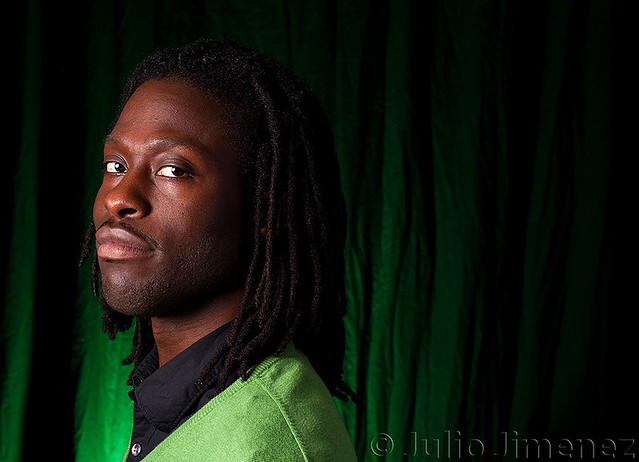 |
| Roger Reeves [Julio Jimenez] |
from Roger Reeves's King Me:
Self-Portrait as Vincent van Gogh in the Asylum at Arles
The moths in the orchard squeal
with each pass of the mistral wind.
Yet the reapers and their scythes,
out beyond the pear trees, slay wheat
in sure columns. Christ
must have been made of shocks
of wheat. When they lashed him,
four bundles of fine yellow burst forth
from each welt. And the women,
tarrying as they do now behind the swing
and chuff of the reapers' blades,
gathered and plaited the stray pieces
of wheat falling from his hips into braids,
long braids that would bind a tattered sail-
cloth over his yellow mouth, yellow feet.
Oh to be bound by one's own blood
like a burlap sack cinched around the neck
with a leather belt. Father, forgive me
for the moths shrieking in the orchard
of my mouth. Forgive the rattle and clatter
of wings inside the blur of my brain.
Even if these iron bars queer a field,
queer a woman standing too close to a reaper's blade,
a half-moon hung and wholly harsh,
even if this woman, burdened like a spine
carrying a head and a basket of rocks,
forgets the flaw of a well-sharpened tool,
let her not mistake my whimper and warning
for the honk of a goose in heat. Father,
she is not made like our savior,
of straw, of a coarse tender. Nothing will stop
when her blood runs along a furrow.
The sun will not sag with a red scowl.
The field will not refuse water, Father,
I am unsure of what I am —
a fragrant mistral wind or a pile of moth's heads
at the foot of a pear tree. Father,
give me a scythe. Father, let me decide.
Every Casket, a Pause
Leaking white into the plum-crushed tunic of night,
the geese drop their tiny anvils onto the lake,
our heads, as if your brother floating below our boat
weren't forcing enough silence into our throats.
Should I gather and burn what falls? What beast
should I press to your back and breast, let suck
at the fine ribbon of grief knotted at your neck?
I have an animal for every occasion. And another
for the occasion after. Our boat tangled in the crown
of a pine. Your hand, hacking at the needles. Too much
blood in the water. Dead Love, Dear Pine Piercing
The Top of This Flooded Lake, who will cut us down,
burn what remains, leave feathers to clot our throat?


